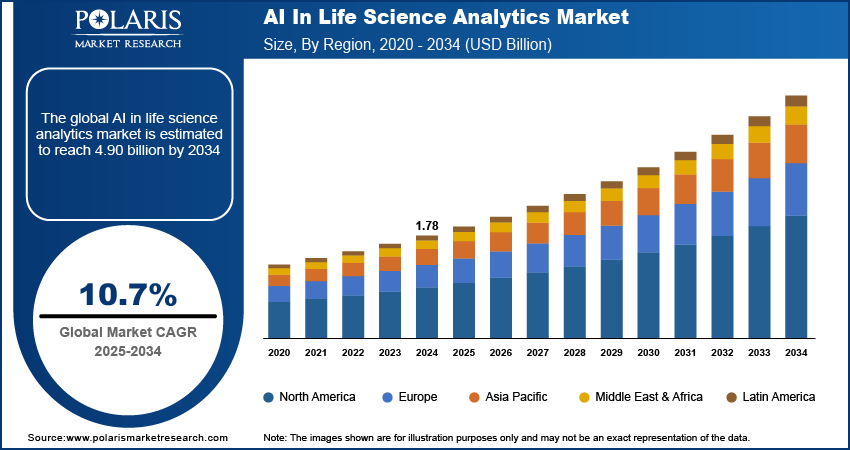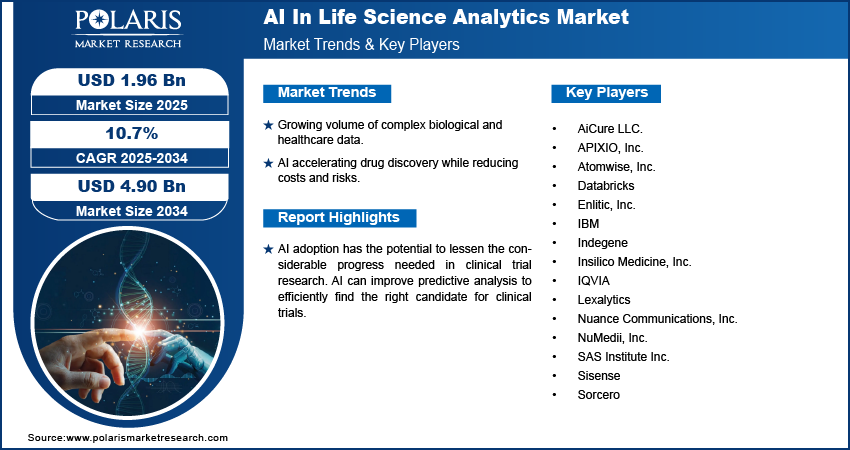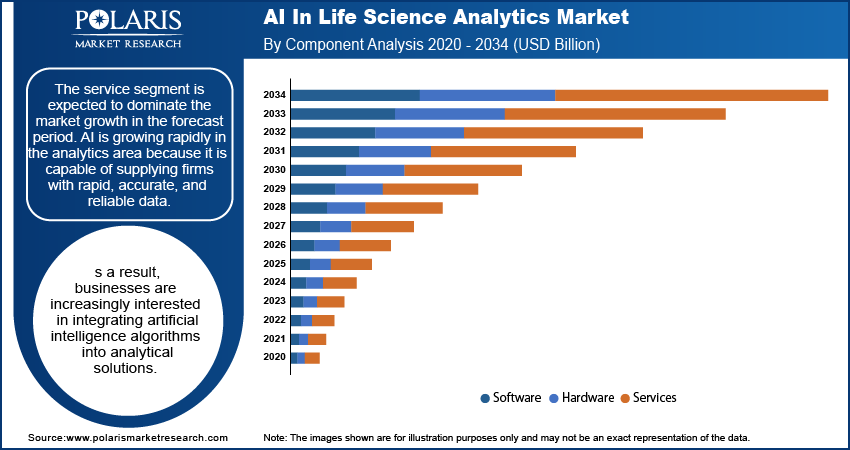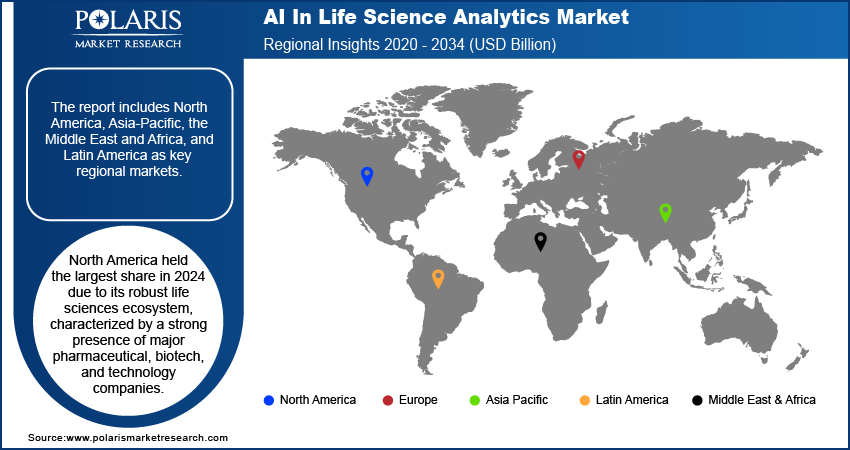
AI In Life Science Analytics Market Share, Size, Trends, Industry Analysis Report
By Component (Software, Hardware, Services); By Deployment; By Application; By End-user; By Region; Segment Forecast, 2025 - 2034
- Published Date:Oct-2025
- Pages: 114
- Format: PDF
- Report ID: PM2952
- Base Year: 2024
- Historical Data: 2020-2023
What is the AI in Life Science Analytics Market Size?
The global AI In Life Science Analytics market was valued at USD 1.78 billion in 2024 and is expected to grow at a CAGR of 10.7% during the forecast period. AI Analytics has developed as a useful tool for several pharmaceuticals, biotechnological, and medical device companies since these alternatives assist overcome data integration issues and improving operational efficiency. In the pharmaceutical and life sciences industries, regulatory compliance reporting, marketing, and sales assistance, and product and service enablement are the main applications of analytics which can be done by AI in less time with high efficiency.
Key Insights
- By component, the service subsegment held the largest share in 2024, as it is the foundational layer for developing and running AI algorithms and platforms.
- By deployment, the cloud deployment model held the largest share in 2024, due to its high scalability, flexibility, and cost-effectiveness of cloud platforms.
- By application, research & development held the largest share in 2024 due to the transformative ability of AI to significantly accelerate target identification, molecular design, and efficacy prediction.
- By end user, pharmaceutical companies held the largest share in 2024 due to their substantial and increasing investments in AI platforms to streamline their R&D efforts and optimize clinical trial management.
- By region, North America held the largest share in 2024 due to its robust life sciences ecosystem, characterized by a strong presence of major pharmaceutical, biotech, and technology companies.
Industry Dynamics
- The increasing volume of complex biological and healthcare data, such as genomics and clinical records, is a primary factor.
- AI substantially accelerates the drug discovery and development timeline, lowering the significant costs and risks typically associated with bringing a new therapy to the market.
- The growing demand for personalized medicine is a powerful factor driving AI adoption.
Market Statistics
- 2024 Market Size: USD 1.78 billion
- 2034 Projected Market Size: USD 4.90 billion
- CAGR (2025-2034): 10.7%
- North America: Largest market in 2024

To Understand More About this Research: Request a Free Sample Report
Impact of AI on Market
- AI is revolutionizing the research and development (R&D) segment by drastically accelerating the drug discovery process.
- AI allows companies to analyze complex genomic and clinical data to develop highly tailored treatments and diagnostics.
- AI is creating operational efficiencies throughout the value chain, from manufacturing to supply chain and clinical trials.
The increasing use of AI in the analysis of tiny systems-of-interest particular datasets is greatly improving drug discovery and development, as well as the production of tailored treatments. Additionally, the drug discovery process is becoming increasingly inefficient as a result of numerous issues such as high development costs, poor clinical trial success rates, falling return on investments, and an increased focus on uncommon disorders.
AI adoption has the potential to lessen the considerable progress needed in clinical trial research. AI can improve predictive analysis to efficiently find the right candidate for clinical trials. AI in analytics is widely used in the life science analytics business to assess risk, evaluate clinical trial efficacy, deliver tailored treatment, establish a quicker and more productive research and development pipeline, estimate profits and budget, regulate product pricing, and anticipate viral evolution.
Many market participants in the life science business are rapidly investing in the adoption of AI-based technologies, which drives demand for AI Analytics in the life sciences area. For instance, in October 2021, Ever Fortune.AI and Medexprim announced their strategic alliance to advance medical AI research and healthcare analytics.
The COVID-19 pandemic's sudden outbreak has disrupted the operations, sales, and marketing of many different businesses, including automotive, manufacturing, and many more. Despite the devastating effect of COVID-19 on the rest of the businesses, some, such as healthcare and pharmacy, develop at an exponential rate during the period. Healthcare spending and investment in research and development of appropriate drugs for the rapid and early recovery from COVID-19 virus infection has also benefited the drug development and research department in the healthcare industry. Even, life science research, which is related to medicine development, was likewise the least affected by the COVID-19 epidemic. As a result, the market for Artificial Intelligence (AI) in life science analytics has shown significant development throughout the pandemic era and is projected to continue in the upcoming years.

Industry Dynamics
Which are the major factors driving the AI in Life Science Analytics Market Growth?
Growth Drivers
AI adoption is growing in clinical trials. Clinical trials are a time-consuming procedure that can be aided by artificial intelligence. To deal with such operations, pharma firms have been aggressively investing in the development of AI solutions that assist to read or scan big datasets faster and more precisely. As a result, the expansion of AI in life science analytics has been dramatic.
Also, the rising need for pharmaceuticals to treat complicated diseases such as cancer is driving the growth of the AI In Life Science Analytics market. The drug discovery process is getting increasingly inefficient as a result of numerous issues such as high development costs, poor clinical trial success rates, declining return on investments, and a growing emphasis on uncommon disorders.
Additionally, various governments throughout the world are launching programs to promote AI and its influence on the healthcare and life science industries. For example, in early January 2021, the White House formed the National Artificial Intelligence Initiative Office to review and implement the United States' national AI policy. As a result of the Trump Administration's policies have kept the United States as the international leader in artificial intelligence.
Report Segmentation
The market is primarily segmented based on form, product, application, and region.
|
By Component |
By Deployment |
By Application |
By End User |
By Region |
|
|
|
|
|
Know more about this report: Request for sample pages
The service segment is expected to witness the fastest growth
The service segment is expected to dominate the market growth in the forecast period. AI is growing rapidly in the analytics area because it is capable of supplying firms with rapid, accurate, and reliable data. As a result, businesses are increasingly interested in integrating artificial intelligence algorithms into analytical solutions. The development of data analytics firms' services and rising technical partnerships are boosting the segment's growth.
For example, in September 2020, Pharmaspectra and IBM Watson Health announced a strategic agreement. The new partnership between the two firms aims to simplify IBM Watson Health's product portfolio by boosting its emphasis on innovations and new tactics that enable and support IBM's life science clients through digital transformation.

The cloud segment accounted for the largest market share in 2024
The cloud segment will lead the worldwide AI in the life sciences analytics market during the forecast period. Growing internet penetration, the creation of innovative cloud-based services, rising expenditures in the growth of IT and telecommunications infrastructure, and the simplicity of operation associated with cloud-based servers are the primary drivers driving the growth of the cloud sector in the market. Furthermore, cloud-based AI services are excellent for many enterprises because they reduce the need for massive data centers, which demand a major investment. As a result, cloud-based AI is less expensive, resulting in profitable growth.
The sales & Marketing sector is expected to hold the significant revenue share
Sales & Marketing segment is expected to show the highest growth in the forecast period. AI benefits such as marketing automation, improved personalization, decreased mistakes, and smarter and faster decision-making skills, are driving the market growth. To compete, large organizations that supply solutions are adopting AI in the sales and marketing departments. Using powerful algorithms, AI successfully analyzes consumer data and automates repetitive operations.
The research and development section is predicted to increase at the fastest rate throughout the forecast period due to the increasing use of AI-based analytical solutions in drug research and clinical trials. Leading firms are continually investing in the creation of new creative pharmaceuticals for the treatment of serious diseases such as cancer, diabetes, and other infectious diseases that demand substantial research and development. As a result, the market is likely to grow rapidly in the future years.
The pharmaceutical sector is expected to hold the significant revenue share
In 2024, the pharmaceutical category is expected to have considerable shares during the forecast period. Some of the drivers fueling the segment's growth include the increased use of AI technologies in manufacturing, clinical trials, and drug development processes. The application of these techniques can expedite the identification of novel compounds, significantly cut cycle times and costs, and improve clinical results. Furthermore, pharmaceutical producers may utilize AI technologies to discover quality control concerns and foresee established bottlenecks, which is predicted to encourage wider usage of this technology.
The biotechnology segment is expected to increase rapidly throughout the forecast period due to the benefits of using this technology, such as quicker R&D, effective decision-making, homogeneous database analysis, and cost-effectiveness. Furthermore, by integrating these solutions, biotechnology companies may optimize their organizational workflows and obtain a competitive edge. Furthermore, machine learning is employed to comprehend massive genomic data sequences and genomic data sets, which is likely to fuel segment growth throughout the projection period.
The demand in North America is expected to witness significant growth
North America led the AI In Life Science Analytics Market due to higher demand for AI technologies, improved digital literacy, and breakthroughs in life science analytics in the area all contributed to this expansion. Furthermore, the United States has several major pharmaceutical and biotech firms. The massive expenditures made by US-based pharmaceutical corporations in drug research and clinical trials have resulted in a large demand for AI analytics.
Asia Pacific is predicted to develop at the fastest rate throughout the forecast period, owing to increased expenditures by various research firms in the use of AI software and hardware to improve operational efficiency. Major businesses in Asia Pacific are focusing more on the implementation of AI-based analytical tools to improve operational efficiency, which is also important for market growth.

Competitive Insight
Who are the major players in AI in Life Science Analytics Market?
Some of the major players operating in the global market include Indegene, IBM, IQVIA, SAS Institute, Databricks, Lexalytics, Sisense, and Sorcero. Atomwise, NuMedii, AiCure LLC., Nuance Communications, APIXIO, Inc., Insilico Medicine, Enlitic, Inc.
Recent Developments
In August 2022, CloudMedx introduced the ACO REACH Explorer to integrate and display diverse data while also improving health equality and Omni channel patient interaction.
In October 2021, Ever Fortune.AI and Medexprim announced their strategic alliance to enhance healthcare analytics and the creation of medical AI.
AI In Life Science Analytics Market Report Scope
|
Report Attributes |
Details |
|
Market size value in 2024 |
USD 1.78 billion |
| Market size value in 2025 | USD 1.96 billion |
|
Revenue forecast in 2034 |
USD 4.90 billion |
|
CAGR |
10.7% from 2025 - 2034 |
|
Base year |
2024 |
|
Historical data |
2020 - 2023 |
|
Forecast period |
2025 - 2034 |
|
Quantitative units |
Revenue in USD billion and CAGR from 2025 to 2034 |
|
Segments covered |
By Component, By Deployment, By Application, By End-user, By Region |
|
Regional scope |
North America, Europe, Asia Pacific, Latin America; Middle East & Africa |
|
Key companies |
Indegene, IBM, IQVIA, SAS Institute Inc., Databricks, Lexalytics, Sisense, Sorcero. Atomwise, Inc., NuMedii, Inc., AiCure LLC., Nuance Communications, Inc., APIXIO, Inc., Insilico Medicine, Inc., Enlitic, Inc. |
FAQ's
The global ai in life science analytics market size is expected to reach USD 4.90 million by 2034.
Top market players in the market are Indegene, IBM, IQVIA, SAS Institute, Databricks, Lexalytics, Sisense, and Sorcero. Atomwise, NuMedii, AiCure LLC., Nuance Communications, APIXIO, Inc.
North America contribute notably towards the global ai in life science analytics market.
The global ai in life science analytics market expected to grow at a CAGR of 10.7% during the forecast period.
The ai in life science analytics market report covering key segments are form, product, application, and region.
